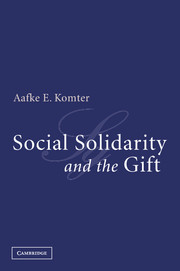5 - Social Theory and Social Ties
Published online by Cambridge University Press: 24 November 2009
Summary
As to the question which gave rise to this work, it is that of the relations between the individual personality and social solidarity. What explains the fact that, while becoming more autonomous, the individual becomes more closely dependent on society? How can he simultaneously be more personally developed and more socially dependent? For it is undeniable that these two developments, however contradictory they may seem, are equally in evidence. That is the problem which we have set ourselves. What has seemed to us to resolve this apparent antinomy is a transformation of social solidarity due to the steadily growing development of the division of labour.
(Emile Durkheim 1964a [1893]: 37–38)How is social order created? How is social order maintained? What makes people live together in peace and initiate mutual ties? What are the origins of the trust that is needed to be able to exchange goods and services? What are the psychological, social, and cultural conditions for the development of social ties? Those are the old questions to which social science – as advanced by its classical as well as its more modern authors – has attempted to find answers. The theme of social order has not exclusively been a central focus in the sociological discipline, but also in anthropology. In addition to Durkheim, Weber, and Parsons, who took primarily (but not exclusively) Western society as point of departure for their analyses, ethnologists and anthropologists such as Malinowski and Lévi-Strauss have studied the conditions for the genesis of a common culture.
- Type
- Chapter
- Information
- Social Solidarity and the Gift , pp. 101 - 122Publisher: Cambridge University PressPrint publication year: 2004



